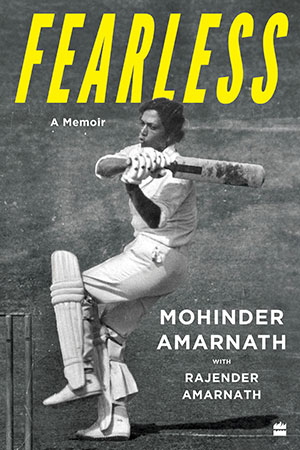In the recently released autobiography, Fearless - a Memoir, Mohinder Amarnath provides a candid account of his cricketing life. Throughout his cricketing career of almost two decades, he fought against the fiercest of bowlers. Mohinder sheds light on his formative years under the watchful eyes of his father and his time on the international stage.
His frank, forthright and anecdotal memoir, written with his brother Rajender Amarnath, gives readers a keen insight into his personality and a glimpse of a bygone, glorious era of cricket.
Especially known for his many comebacks into the Indian cricket team and for his outspokenness towards the latter part of his career, Mohinder Amarnath called the selectors a "bunch of jokers" after being dropped for the umpteenth time in 1988.
In the Prologue, he says, "I have endured several exclusions, many machinations in the cricket board, step-motherly treatment and back-stabbing. My story is also about aspirations, rollercoaster rides, happy moments, depression and triumph. My comebacks would not have been possible without the support of my family. My parents and my wife, Bickoo, stood by me like the Rock of Gibraltar!
My mother played a prominent role in streamlining my life and moulding my character. Under her influence, I gradually acquired calm, composure and balance. However, on the field, I inherited my father, Lala Amarnath's spirit. Although I did not exhibit his aggressive posture, I had the same sort of willpower."
At the end of the second chapter, First Step towards the goal, Mohinder Amarnath has mentioned about meeting the greatest batsman of all-time Sir Donald Bradman during the tour to Australia with the Indian Schoolboys' team in 1968-69. "He too spoke fondly of the Indian tour of 1947 and about Papaji. I presented to him a silver salver with Papaji's message, which made the function more personal and enjoyable. My dreams were turning into reality and I looked forward to representing India in Test matches."
Commenting on two captains during the 1982-83 tour to Pakistan, Mohinder says this tour showed how personal guidance could influence the performance of the struggling players. "If one had to equate the leadership capabilities of Imran and Gavaskar, though both were great in their domain, the former scored over the latter in man-management. Imran led by example to get the best from his boys. He reached out to every player and offered advice.
Gavaskar, on the other hand, never felt it necessary to get close to his players. He was not a fitness freak and hardly took interest in it. In batting, his talent had no parallel, hence all his energy went in concentration and endurance. He worked extremely hard to solve his batting problems, and expected other players at the international level to be as mature as he was and to follow the same principle. Gavaskar hardly reached out or understood the problems of his players the way Imran perceived them."
Summing up the 1983 World Cup, he said his journey over the last twelve months was too astonishing even for him to believe. "Here was a cricketer who had been struggling to find a permanent place in the team before the Pakistan tour of 1982. And now I had won the Man of the Match award in the most historic game of Indian Cricket! My case happened to be a classic example of zero to hero! One year down the line and victory in the World Cup had changed everyone's behaviour towards me. Now I had become a 'role model' for the new generation.
Of his 30 first-class hundreds, eleven were recorded in Tests. In 69 Tests, he amassed 4378 runs at an average of 42.50. Among the Indian cricketers with 3000-plus runs in the overseas Tests, Mohinder Amarnath was one of the four batters to record an average of 50-plus - his tally being 3008 at an average of 51.86, including nine hundreds and seventeen fifties in 37 Tests (63 innings). The other three being Sachin Tendulkar (54.74), Rahul Dravid (53.61) and Sunil Gavaskar (52.11).
The year 1983 was his best in terms of run-aggregate and centuries in Tests, aggregating 1077 at an average of 46.82, including four hundreds and seven fifties, in 24 innings (14 Tests). His best two Test series in terms of runs were - vs West Indies in the Caribbean in February-April 1983, aggregating 598 in nine innings, including two hundreds and four fifties - the sequence of scores being 29 & 40 at Kingston; 58 & 117 at Port of Spain, 13 at Georgetown; 91 & 80 at Bridgetown and 54 & 116 at St.John's. His tally was the highest on either side - the next best being West Indian captain Clive Lloyd - 407 at an average of 67.83.
Managed 584 runs at an average of 73.00, including three hundreds and three fifties, in six Tests in Pakistan in 1982-83. Both the series - vs Pakistan in 1982-83 and vs West Indies in 1982-83 fetched him the player of the series awards.
Mohinder's best year in ODIs was 1988, managing 584 runs at an average of 53.09, including two hundreds (100 not out vs West Indies at Faridabad and 102 not out vs New Zealand at Sharjah on March 27) and two fifties, in 15 innings. Apart from his three MOM awards vs West Indies, he was adjudged MOM twice vs Pakistan and once each vs Australia, England and New Zealand.
All in all, the book is an interesting read. The pictures which decorate many of the 457 pages, enhance the overall effect.
|

